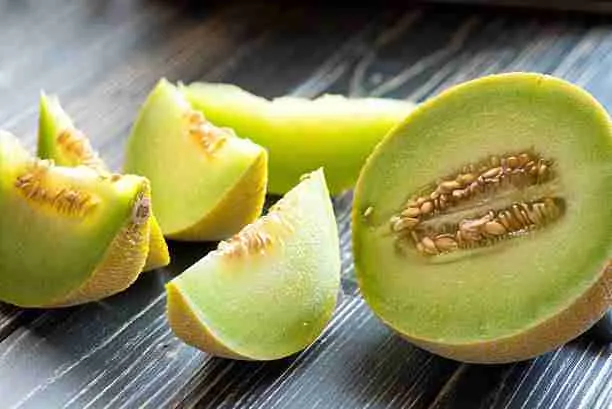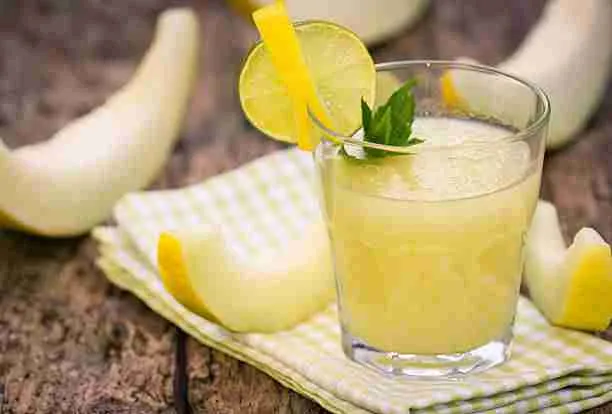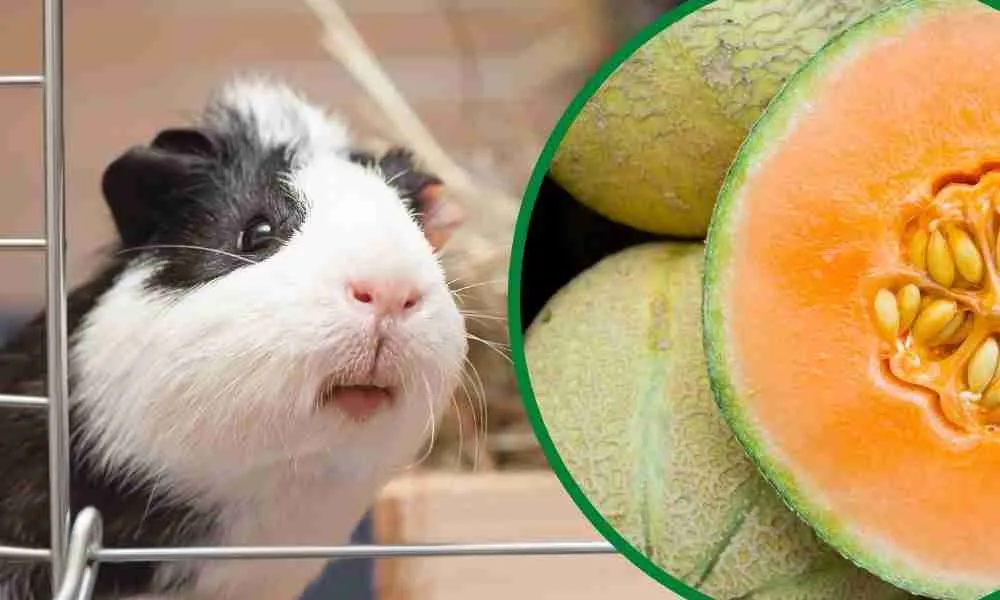As you thought of some tasty fruit to offer your guinea pig, honeydew melons must have crossed your mind. However, you need to know if it’s a safe one to offer them.
So, this leaves you wondering – can guinea pigs eat honeydew melon?
Yes, guinea pigs can eat honeydew melon.
This tasty fruit is rich in fiber, vitamin A, C, K, and potassium. However, you can only offer this fruit to guinea pigs in moderation due to the sugar content.
Honeydew melon tastes and smells great, which is why guinea pigs generally love them. In addition, you shouldn’t make it a major food in their diet.
Therefore, honeydew melons are better as fruit treats for guinea pigs.
But before feeding them the whole melon, it may be wise to know what parts are safe to eat.
Think about it, can you just feed your guinea pigs any parts?
Let’s find out…
Table of Contents
What Part of the Honeydew Melon Can Guinea Pigs Eat?
Honeydew melons are quite hard on the outside but very juicy on the inside. The juicy flesh is the main part of this fruit to offer as treats to your cavy.
However, there are several other parts to consider as the skin, leaves, and flowers.
In addition, let’s look at them below to be sure if your guinea pig can have them.
Can Guinea Pigs Eat Honeydew Melon Seeds?
Not at all! You shouldn’t feed honeydew melon seeds to your guinea pigs. Honeydew melon seeds are quite harmful to guinea pigs as they could cause choking hazards.
However, it’s just the same with any other seed. They are just toxic for them. So, you should always remove them whenever you’re making this fruit treat for your cavy.
Can Guinea Pigs Eat Honeydew Melon Skin/Rind?
Yes, guinea pigs can eat honeydew melon skin or rind. It contains fiber, vitamin C, and many other important nutrients just like the flesh.
However, it’s always better to leave this part out as they are tough for guinea pigs to digest. A honeydew melon treat is just fine without it.
Nevertheless, if you still want to offer some to your cavy to eat, it should be in bits.
Also, it’s equally important that you wash this part well before letting your guinea pigs eat them.
Can Guinea Pigs Eat Honeydew Melon Leaves?
No, you shouldn’t feed them this part. Honeydew melon leaves are not yet a proven part to offer to cavies as food or even treats.
So, leave them out whenever you’re preparing this fruit treat for your furry friends.
Can Guinea Pigs Eat Honeydew Melon Flowers?

No, guinea pigs can’t eat honeydew melon flowers. You can only feed guinea pigs only foods that are safe for them.
So, for these flowers, there’s no strong proof of how safe it is for guinea pigs to eat. Moreover, to avoid any risk to their health, do not serve this.
How Much Honeydew Melon Can Guinea Pigs Eat?
You should give your cavy a small cube of honeydew melon that’s about an inch in size. You shouldn’t offer large chunks of this fruit to your guinea pigs as it can harm them.
Remember, this fruit is so sweet because of the sugar content in it.
Guinea pigs do not need so much sugar as it can be very dangerous for their health.
Also, other nutrients like calcium, phosphorus, etc. can do bad things to your cavy when they get it in excess. This is why moderation is important as you get to keep things balanced by offering them this amount.
In addition, you should let this fruit come into their diet gradually.
Pro Tip: let your cavy have a little taste of it first. Offer a smaller-sized cube to them to check for any possible changes your little pet could experience.
If they seem fine with it and their health is not affected in any way, go ahead and give them the normal serving size.
However, if your guinea pig reacts strangely to it, resume feeding this fruit to them some other day. However, serve an extra small size this time around so they can slowly get used to it.
Moreover, let’s know how often guinea pigs can have honeydew melon treats. Can they have it every day? Let’s find out next!
How Often Can You Feed Honeydew to Guinea Pigs?
Never serve them honeydew melon more than twice a week. You cannot offer this fruit to your cavy every day. It’s only safe for your cavy to eat as a treat occasionally.
This is to make sure that your cavy can enjoy this treat without facing any health issues. Also, spacing these serving days is important.
If you serve them twice a week make sure these days are a bit far from each other. For instance, if you begin today, the next serving day should be like two days after.
You can check the table below to guide you better…
| DAILY SCHEDULE | |
| Monday | Feed honeydew |
| Tuesday | Skip |
| Wednesday | Skip |
| Thursday | Skip |
| Friday | Feed honeydew |
| Saturday | Skip |
| Sunday | Skip |
However, let’s look at the nutritional value of honeydew melon per 100 g serving below.
Nutritional Value of Honeydew Melon
| Nutrients | Amount Per 100g |
| Vitamin C | 18 mg |
| Vitamin A | 3 mcg |
| Carbs | 9 g |
| Protein | 0.54 mg |
| Calcium | 6 mg |
| Vitamin K | 2.9 μg |
| Calories | 36 Kcal |
| Potassium | 228 mg |
| Phosphorus | 11 mg |
| Vitamin B6 | 0.088 mg |
| Sugar | 8.12 g |
| Fats | 0.14 |
| Magnesium | 10 mg |
| Fiber | 0.8 g |
Benefits of Feeding Honeydew Melon for Guinea Pigs

Interestingly, honeydew melons aren’t just tasty snacks you can offer to your guinea pigs. These fruits are loaded with lots of health benefits for your furry friends.
Let’s look at these benefits below:
Builds Strong Immunity
This fruit is filled with lots of immunity boosters like vitamin C, A, and many antioxidants. This is good news because they can help to fight many diseases that come about in your cavy’s body.
Also, as a vitamin C-enriched fruit, honeydew melon can give guinea pigs the vitamin C they need. Guinea pigs’ bodies fail to produce vitamin C and that’s why they suffer from scurvy when they lack it.
So, honeydew melon is one of those rich sources of vitamin C your guinea pigs can depend on. Also, it’s an immunity booster!
Helps in Digestion
Honeydew melon is a good source of fiber, which is very important for your guinea pigs’ digestion.
Guinea pigs have weak digestive systems which make them face so many digestive issues all the time. They need help from foods that are rich in fiber to help them digest other foods they eat.
So, feeding them this fruit will help improve good bowel movements. Also, it will prevent several digestive issues from happening to your furry friends
Improves Eyesight
You’ll find sight-boosters like vitamin A in honeydew melon. It helps to keep your little pet’s sight in good condition.
When guinea pigs grow old, they normally have poor vision. So, offering them this fruit treat is a good way to help them maintain normal vision.
Guinea pigs’ eyes are important parts so they need proper care. You wouldn’t want your pet to have problems recognizing you
Keeps Bone and Teeth Healthy
Honeydew melon has calcium, phosphorus, and magnesium in it, which helps to improve the health of your cavy’s bones and teeth.
Guinea pigs need to do a lot of chewing so that the plant foods they eat can digest easily. However, weak teeth won’t allow this to happen and cause many problems for your guinea pig.
Weak bones on the other hand are bad for your guinea pigs as they won’t be strong enough to support their bodies.
Also, in such conditions, they can easily get fractured.
So, healthy teeth and bones are very important for your little pet’s well-being and honeydew melons can help to get that.
Improves Cardiovascular Wellbeing
Honeydew melon contains potassium. This helps to lower high blood pressure that causes serious health problems for the heart.
It also helps your guinea pig’s muscles, especially the heart muscles, to contract well thereby promoting a good heartbeat. This will make your little pet breathe properly.
Also, honeydew melons are low in cholesterol and fats.
So, it’s a healthy fruit for the proper flow of blood from the heart and back to it.
In short, potassium keeps the heart in good condition and safe from many health issues relating to it.
Helps in Healing Wounds
Honeydew is also a rich source of vitamin K, which is an important nutrient for wound recovery. This vitamin produces the protein for blood clotting.
So, if your cavy gets injured, they won’t have continuous bleeding. This in turn promotes quick recovery as wounds cover up faster.
Helps in Hydration
This juicy fruit is almost made up of water. If their body lacks water, some vital organs won’t be able to function properly.
In addition, certain diseases can come up with ease if their body lacks water. So, staying hydrated is very important for your guinea pigs.
If your guinea pig is the type that doesn’t drink water so much, this fruit can help increase the amount of water they’ll get in a day.
Risk in Feeding Honeydew to Guinea Pigs
Allergic Reaction
Your little pet can develop an allergy to honeydew melon when they try it for the first time. However, this doesn’t happen to all guinea pigs.
Your guinea pig might experience it and another might not.
The main problem with these reactions is that they are mostly health issues. This is why new food should come into a guinea pig’s diet slowly.
In this way, they can safely get used to it.
Obesity
Though honeydew is low in fats and cholesterol, its high sugar content can cause obesity. However, if you feed them the right amounts of honeydew melon, the sugar won’t harm them.
However, excess honeydew melon treats at once mean excess sugar for your guinea pigs and that’s bad. This, in turn, can promote obesity and even diabetes.
Digestive issues
No doubt, fiber helps guinea pigs digest food properly. Interestingly, this nutrient can cause so much harm to your pet other than the good it does for them.
Also, sugar can affect your little pet’s tummy. However, all of these can happen when you offer too much honeydew melon to them.
Guinea pigs will get excess fiber from it which isn’t good at all.
On the contrary, it’ll then cause different digestive issues like gases, vomiting, loose stool, etc.
Excess sugar will lead to bloating, diarrhea. Your guinea pig can have bad bowel movements, vomiting, and gas.
Kidney and Bladder Stones
Calcium is one of the most important nutrients for a guinea pig to stay healthy. However, Guinea pigs, especially fully grown ones, don’t need calcium in big amounts.
Aside from the good it does, too much of it can cause big problems for your little cavy. Guinea pigs can get excess calcium when you go beyond the recommended serving sizes.
When this happens, they can form stones in your guinea pig’s kidney or bladder. The condition can be very painful for your pet and can result in urinary infections.
What Are Other Fruit Alternatives of Honeydew for Guinea Pigs?
It’s very healthy for your guinea pigs if they always get different kinds of fruits from time to time. Serving them one kind of fruit, like honeydew melon, isn’t right at all.
Remember, guinea pigs can only eat honeydew melon once or twice a week.
This means your guinea pigs will need some other healthy fruits as treats for these empty days.
This is why we’ve shared some healthy fruit alternatives of honeydew melon for your cavy in the table below:
| Watermelons | Tomatoes | Raspberries |
| Papayas | Mangos | Pineapples |
| Apples | Tangerines | Peaches |
| Pears | Grapes | Kiwi fruit |
| Bananas | Nectarines | Blueberries |
| Cranberries | Cucumbers | Oranges |
Before serving any fruit, try to know the right serving sizes first. Just like honeydew, guinea pigs can only have these fruits in moderation.
So, if you’re planning to serve honeydew melon in a cup of other healthy fruits, only use fruits that are low in sugar content.
In addition, these alternatives are also useful when you find out your guinea pigs don’t like a honeydew melon at all. It’s normal if they don’t.
Just like humans, they also have preferences!
Can Guinea Pigs Eat Honeydew Melon Juice?

Not at all! You shouldn’t feed honeydew melon juices to guinea pigs. These juices might be so nutritious for us but they are very harmful to these little pets.
The sugar content in these juices is so much and can cause different issues for guinea pigs. It could lead to digestive issues or even worse conditions like diabetes.
So, to keep your cavy safe, stick to giving them fresh honeydew melon treats.
Can Guinea Pigs Eat Honeydew Melon During Pregnancy?
Of course! Guinea pigs can eat honeydew melon during pregnancy. The nutritional needs of pregnant guinea pigs increase.
Their vitamin C needs can become double. Even calcium is very important for them during pregnancy. Interestingly, honeydew melon is rich in these nutrients and many others.
So, offering them honeydew melon is safe.
However, still, keep serving sizes in bits. You can increase the sizes of the honeydew melon for pregnant guinea pigs due to their increased nutritional needs.
Final Thoughts
To conclude, guinea pigs can eat honeydew melons. They are tasty fruit snacks you can offer to your cavy.
This fruit has a lot of important nutrients like fiber, vitamin C, A, K, and potassium. So, it’s a healthy one for guinea pigs and with a lot of health benefits too.
However, you can only serve a small amount to your guinea pig. This fruit is so tasty so don’t be tempted to give your cavies so much just because they like it.
Remember, it cannot be a major food.
Moreover, visit more of our blogs like this one to get more information about guinea pigs, especially the foods they eat.
Certainly, you learned a lot from this one, don’t hesitate to share it with other guinea pigs lovers.
